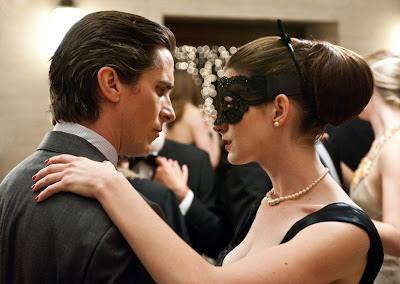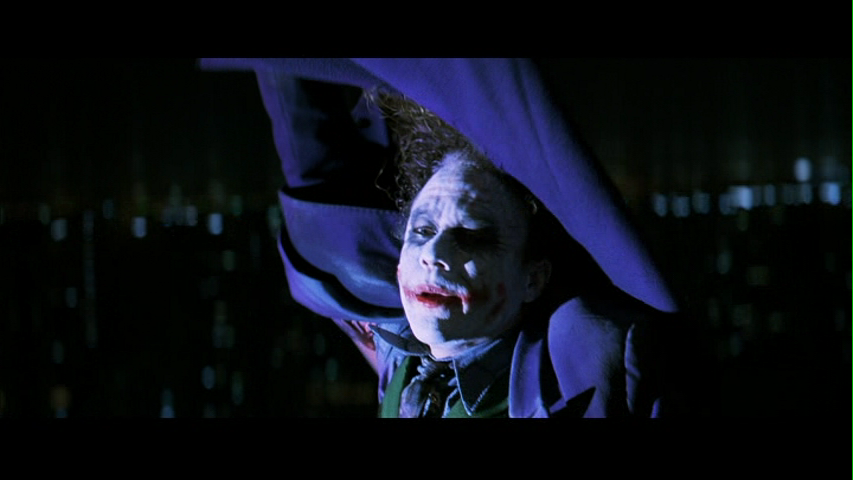There sure is a lot of speechifying in “The Dark Knight.” I don’t think I’ve experienced a movie with this much speech making since John Wayne’s “The Alamo.” (1960). The difference is “The Alamo” is a great movie and “The Dark Knight” is not.
It’s not even a good movie. It has two very good performances and a germ or two of interesting ideas buried under a bloated running time, badly staged action scenes and an insistence by director Christopher Nolan and his screenwriter brother Jonathan to sledge hammer their audience with its central thesis: there is no difference between heroes and villains.
The positives: Heath Ledger’s portrayal of the Joker. Brilliant and unsettling. It’s far and away the best thing in the movie, a great performance in a mediocre movie. Just as good is Aaron Eckhart as District Attorney Harvey Dent, who transforms into the villain Two Face. I’m afraid Eckhardt is being overlooked in favor of Ledger and it’s too bad, because Eckhardt has the more difficult role, transforming from crusading D.A. into tragic villain.
Let’s get back to that central thesis, which is repeated several times throughout the film. I can’t remember the exact dialogue (and I have no intention of seeing this film any time soon, if not ever), but it goes something like this: “either you die a hero or live long enough to become the villain.”
That’s pretty grim and nihilistic for a summer blockbuster based on a comic book. Part of me tips the hat to Nolan and Warner Bros. for throwing commercial considerations to the wind and making such a dark movie. Maybe I would have bought it more in any other movie than a Batman movie. I can also appreciate that just because it’s a comic book can’t mean it has to be all bright and sunny, and that dark themes can be explored.
But it’s still a comic book, and you have a character who runs around at night catching criminals while wearing a costume with a cape, and a mask with pointy ears. The contrast between the grimness and the pointy ears is enormous
Matters aren’t helped any by having Christian Bale deliver his Batman lines with a deep and throaty growl. At one point he really digs down to his diaphragm to say his lines and I had to stifle a chuckle lest the Batman fans around me threw me out. All I could think of was Batman smoking too many cigarettes and drinking bad booze at 3 a.m. dive bars. It’s actually quite amusing. I suppose he wanted a voice that would cause fear in the criminal world, but I would think the outfit and the ability to swoop down from out of nowhere would be enough for Gotham City’s underworld denizens.
All the characters pontificate endlessly about the nature of good vs. evil. Other points of discussion: does Batman really bring down the crime rate or cause it to rise due to his presence? Would the Joker have come to Gotham City without Batman there? Did they make each other, would one exist without the other?
I dunno, but I do believe there’s always been good guys and bad guys. Simplistic perhaps, but true. The character’s endless navel gazing here drove me to distraction. Again, I can appreciate where Nolan was coming from, but this is a classic case of the central idea repeated ad nauseum under the assumption that we, the audience, are idiots. Even the criminals talk amongst themselves about the forces of chaos, and what they unleashed with the Joker. We get it, enough already.
This central thesis seems to be bowling over many as a new maturity in comic book movies. But “Conan the Barbarian” (1982) offered the same idea, though only in one speech at the end from the villain Thulsa Doom (James Earl Jones) to Conan (Ah-nold) where he says to Conan that without your endless quest for revenge against me you would not be who you are. It’s an interesting idea for an action movie, and director/writer John Milius never forgot to also give us sweeping action scenes, comedy and a love story, qualities sorely missing in “The Dark Knight.”
Let’s take another example. One of the movies’ greatest adventure films is “The Adventures of Robin Hood” (1938) with Errol Flynn. As basic a movie can be, forces of good against forces of evil. I can only imagine what the tale would be like if Christopher Nolan got his hands on the material.
Robin Hood: “Am I doing the right thing by taking from the rich to give to the poor? Am I harming myself in the process? Am I bringing evil on Sherwood Forest by trying to do the right thing? I don’t want to fight, I just want to open my soul to Friar Tuck about this.”
Sheriff of Nottingham: “I was just trying to be a good sheriff for the shire, a humble servant to do the King’s bidding. But Robin Hood and his campaign of terror has forced me to burn villages and tax the already burdened people. He made me do it. He’s the real reason there’s chaos in Sherwood Forest.”
No doubt director Michael Curtiz would throw Nolan out on his ear, and good riddance.
What else didn’t I like? The look of the film is disappointing. As someone who works in Chicago it’s cool to see Gotham City represented as Chicago, but that’s all it is – Chicago. I preferred the look that Nolan gave Gotham City in “Batman Begins” (2005) where he took Chicago but digitally tweaked it to give it a more sinister appearance. Remember the Arkham Asylum from that movie? Great stuff. Here, it’s just Chicago.
Nolan really needs to turn his action scenes over to a second unit director. He botched it badly with his first Batman movie and he botches it here again. The fight scenes are too dark and too many close-ups, where you can’t tell what’s happening. Put a professional stuntman in a Batman suit, shoot some medium scenes, and let us watch the action as its unfolding.
What really sinks the movie is the heavily-based synth score. Though the score was co-composed by Hans Zimmer and James Newton Howard, I would suspect that most of the synth sounds were Zimmer’s. It really cheapens the film. Filmmakers generally use synths when they can’t afford a live orchestra. Zimmer’s heavily synth-based score makes the film sound like a made-for-cable outing. It would have been nice to have a theme too, but that would have be asking too much. There’s a scene where Batman soars in the air (I think in the Hong Kong sequence) and it would have benefited greatly from a theme, but instead the stunt, and scene, just sit there as flat as could be.
It didn’t need a burst of John Williams optimism, because that would have been at odds with the film. But Miklos Rozsa in his great 1940s film noir scores showed how you can use richly textured music to create a sense of doom and hopelessness. Zimmer’s score, I’m afraid, will badly date the film. (The end credits, however, do provide the biggest laugh I’ve had in a movie theater all year: I forget the exact number, but the music credits include something like four conductors and at least eight orchestrators. For this score? The mind boggles.)
Apart from the villains, the performances are nothing to write home about. Michael Caine and Morgan Freeman are their usual professional selves, and that’s enough. They provide the very, very few moments of levity in the film. They’re both so likeable that I wish they had been given more to do.
Maggie Gyllenhall, as the love interest Assistant District Attorney Rachel Dawes, is an improvement over Katie Holmes from the last movie. It’s still a nothing part, but she gives it her best shot. Holmes is a good actress (catch the wonderful “Pieces of April” (2003) some time) but she was miscast in the first film.
Christian Bale tries his best, but it’s a surprisingly one note performance. His Bruce Wayne isn’t particularly likeable or charismatic and I’ve already written about his Batman voice.
And what was up with the Mayor in this flick? The actor’s name is Nestor Carbonell, unfamiliar to me. But he appears to be wearing eye liner. A friend who went with me says he looks like that, he’s got funky looking eyes. I guess he’s on “Lost.” OK, fine, then don’t cast him. During his scenes I thought I was watching “The Crying Game.”
I loved the make up of Two Face, but its obviously CGI in spots. Would it have been asking too much to use real make up?
The film’s too long and could have gone through a re-write or two, or three. A trip to Hong Kong seems superfluous, and the film’s central point of the Joker causing full blown chaos in Gotham City really doesn’t kick in until the final third. It’s a looong time getting there.
In my mind, Tim Burton honored Batman the best with his two Batman movies. Nothing in “The Dark Knight” beats the final iconic shot of “Batman” (1989) showing Batman on the roof of a building, the Bat Signal in the background, and Danny Elfman majestic theme – yes, theme, – soaring to a wonderful and satisfying coda.
If it wasn’t for Heath Ledger and Aaron Eckhart, “The Dark Knight” would be an unbearable, pompous bore.
Parts of the above review are in reaction to a loyal reader who wondered how I would include references to John Wayne, Errol Flynn, Michael Curtiz and Miklos Rozsa into a blog about “The Dark Knight.” I hope I have succeeded.
Rating for “The Dark Knight”: Two stars.
















.jpg)



















